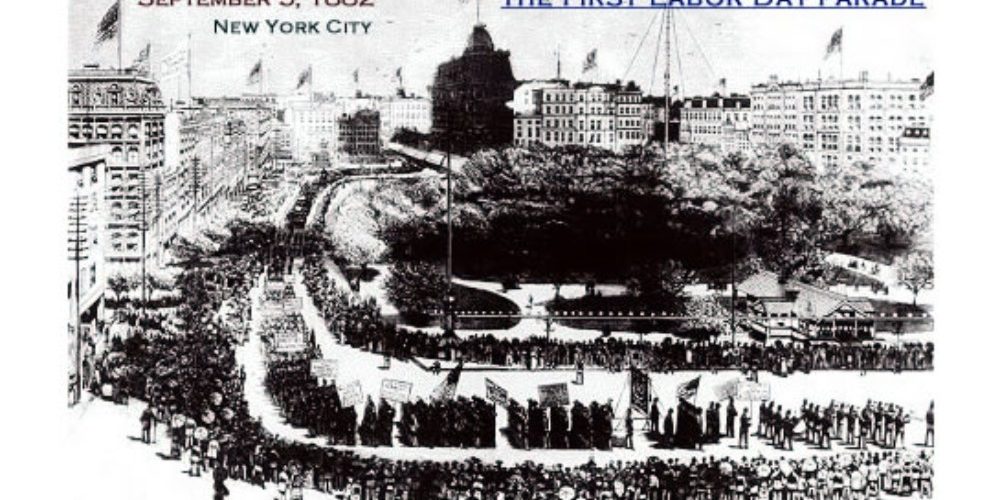Labor or work has its origin in the Garden of Eden. Genesis 2:15 says “the Lord God took the man and put him in the Garden of Eden to work it and take care of it.” (NIV) God did this before the fall as a command and life principle and thus work is good and not a result of the fall. What changed after sin entered the picture was our attitude toward work. We can thus best define one’s character by their attitude toward labor as a life principle. It is important to set this proper context before talking about the holiday known as Labor Day.
The Bible also defines for us a proper work ethic, or the attitude we ought to embrace toward work. Proverbs 12:24 states, “The hand of the diligent will rule, but the lazy man will be put to forced labor.” Those who are diligent will be honored, and those who refuse to work will be forced to do so. Proverbs 18:9 states “He who is slothful in his work is a brother to him who is a great destroyer.” Slothfulness is a character quality of avoiding work and thus procrastinating on a regular basis. Its result is destruction or more specifically the wasting of time and productivity.
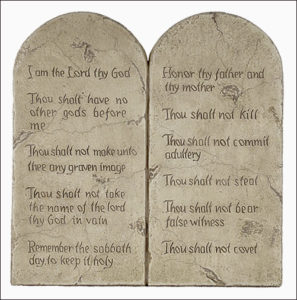 The Fourth Commandment, given to us in Exodus 20:9-10, states “Six days you shall labor and do all your work, but the seventh day is the Sabbath of the Lord your God. In it you shall do no work.” Note that this is a command to work six days a week, as well as preserving a rhythm of rest. God places a great value on work, but also gives us the personal responsibility to protect both time and our physical bodies through regular rest – beginning with the Sabbath (Saturday), the Lord’s Day (Sunday), and other regular times for rest and rejuvenation. It all adds up to a longer life with greater productivity in general. Individuals, families, churches, cultures and nations have been blessed when honoring this principle.
The Fourth Commandment, given to us in Exodus 20:9-10, states “Six days you shall labor and do all your work, but the seventh day is the Sabbath of the Lord your God. In it you shall do no work.” Note that this is a command to work six days a week, as well as preserving a rhythm of rest. God places a great value on work, but also gives us the personal responsibility to protect both time and our physical bodies through regular rest – beginning with the Sabbath (Saturday), the Lord’s Day (Sunday), and other regular times for rest and rejuvenation. It all adds up to a longer life with greater productivity in general. Individuals, families, churches, cultures and nations have been blessed when honoring this principle.
Up until the Civil War, America was a working nation, for almost everyone was self-employed, and those who did work for someone else considered it a team for success where the owner (or employer) and the worker expressed their distinct gifts (whether entrepeneur, sales or physical) to serve others and produce for their neighbors. However when Karl Marx published his Communist Manifesto in 1859, declaring a war between employer and employee; parent and child; public servant and civilian, it spread initially across Europe and and then in America after the Civil War.
During the Industrial Revolution the invention of machines allowed greater production of goods, but the increasing greed of the employer and an attitude of entitlement by the employed enhanced the division that was the result of the diminishing understanding and value of work. The family was no longer the center of employment (like it had been on farms) and factories and mass production increased. In Europe and eventually in America employers put greater and greater pressure on workers, without protecting their need for rest. Adults, and sometimes children, worked from 3 AM to 10 PM.
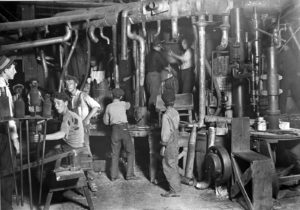 Fathers worked away from home, and his tools were owned more by companies than by himself. His family time was diminished, and he ended up with greater relational ties to fellow employees than his own wife and family since he would often be away from home work for days and weeks at a time. The challenge of mass production could have been met with a worldview of work closer to the priorities of the Bible, but the trend was a more Marxist view and thus the work ethic was more for survival and income than a display of honor to God.
Fathers worked away from home, and his tools were owned more by companies than by himself. His family time was diminished, and he ended up with greater relational ties to fellow employees than his own wife and family since he would often be away from home work for days and weeks at a time. The challenge of mass production could have been met with a worldview of work closer to the priorities of the Bible, but the trend was a more Marxist view and thus the work ethic was more for survival and income than a display of honor to God.
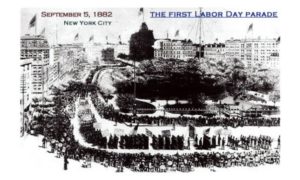 Workers began to take matters into their own hands and formed voluntary Unions for the protection of work hours and their families. Peter McGuire and Matthew Maguire, both officers in their respective United Brotherhood of Carpenters and International Association of Machinists, began to suggest a holiday to publicly honor workers since they were often taken for granted. They got so many workers together on Tuesday, September 5, 1882, they formed a holiday parade in New York City, and no employer dared to fire them.
Workers began to take matters into their own hands and formed voluntary Unions for the protection of work hours and their families. Peter McGuire and Matthew Maguire, both officers in their respective United Brotherhood of Carpenters and International Association of Machinists, began to suggest a holiday to publicly honor workers since they were often taken for granted. They got so many workers together on Tuesday, September 5, 1882, they formed a holiday parade in New York City, and no employer dared to fire them.
Unfortunately, however, the animosity toward the owners of businesses due to their greed, and the strained relationships due to many strikes, was a ripe context in which Marx’s philosophy could be poured. From discussions about better working hours and time off being worked out between employer and employee, it grew into Unions which forced employers to do what workers wanted, and the team concept began to fade. This trend could have been avoided had there been a more Biblical view of work and business where both employer and employed work together as a team for productivity and success.
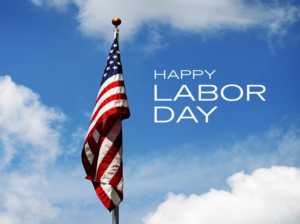 Oregon became the first state to enact a Labor Day, and Colorado, Massachusetts, New Jersey and New York followed the same year. By 1894, 23 states had Labor Day holidays, and President Grover Cleveland signed a Congressional Bill into law making the first Monday of September a national holiday. An eight hour standard day was enacted for all to follow. Initially, Labor Day incorporated a street parade honoring workers, a festival of recreation for workers and their families, and then by 1909 the Sunday preceding Labor Day was to honor the spiritual aspect of work.
Oregon became the first state to enact a Labor Day, and Colorado, Massachusetts, New Jersey and New York followed the same year. By 1894, 23 states had Labor Day holidays, and President Grover Cleveland signed a Congressional Bill into law making the first Monday of September a national holiday. An eight hour standard day was enacted for all to follow. Initially, Labor Day incorporated a street parade honoring workers, a festival of recreation for workers and their families, and then by 1909 the Sunday preceding Labor Day was to honor the spiritual aspect of work.
So what are the lessons we can learn from Labor Day? First, it is good to honor workers, for they are producers; but we should also honor the entrepreneurs and owners, for they provide the jobs. Second, we must honor the fourth commandment so that a positive attitude toward work, avoiding greed on the one hand and entitlements on the other, can take place. Third, businesses should embrace the team concept like Walmart initially did and Market Basket more recently, so we can work together and everyone can prosper. Finally, a restoration of a proper work ethic, together with the restoration of the family, will make the national movements of managing employment from Washington DC needless so that we could return to voluntary self-government and covenantal unity in the work place!

